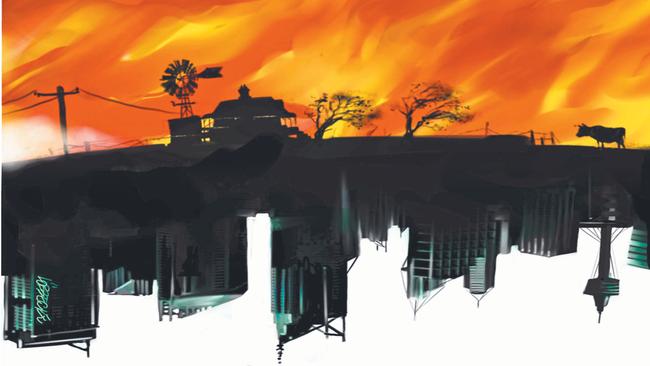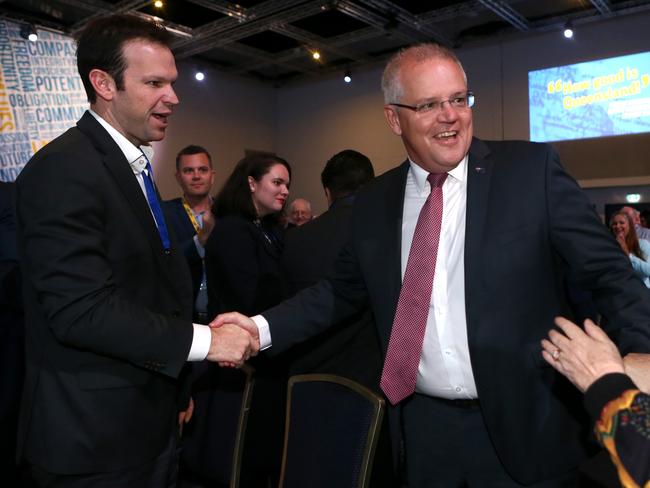Politics of climate change fan the flames of deepening division
Behind this week’s bushfires lurks a deepening economic-environmental crisis and a dilemma for the Morrison government.

The challenge of a fragmented country is only growing. Competing economic and ethical interests are set to intensify. Future policy towards coal-fired power stations divides not just the government’s voters — it divides the Morrison government itself.
The fires — and their inevitable link with a changing climate — will put prolonged pressure on Scott Morrison’s regional-suburban voting alliance that won him the 2019 election. It is not just the Labor Party that battles with contradictory voting constituents.
The Prime Minister has two potentially irreconcilable imperatives: he must respond to mounting public alarm about the global warming threat and he must honour a critical Coalition support base — the resources sector, coal-based power generation and the heavy industries, many regionally based, many Queensland-based, now vulnerable from climate change action, notably aluminium, steel and cement.
The truth is Morrison was re-elected because he was a superior manager to Labor’s Bill Shorten of the new political reality — a fragmented Australia with its contradictory constituencies. The test is whether Morrison can retain this ascendancy.

Superimposed on this task are the entrenched problems of the rural sector and the regions that suffer not just from inferior incomes, jobs and services but as the frontline in the drought and extended fire season. The regions are plagued by changing climate and, in its economic consequences, the risk of a jobs crisis.
Climate change is going to shake the foundations of contemporary society. It is touching nearly every aspect of life.
READ MORE: Chris Kenny: Climate alarmists prey on fear | Greens’ policies increas fire threat: Joyce | Facts on fires forgotten in rush to blame climate
Yet the people who will suffer less and manage best are the high-income, city-based, post-material suburbanites and corporate leaders who spearhead campaigns for radical action that will seriously disrupt many others far less well-off.
The internal political tensions are going to become more inflamed. Nothing is more certain. That was the message this week as Greens and Nationals leaders and politicians abused each other with rival narratives. Morrison was prudent to focus on operational aspects, but the big questions just loom larger. After the fires, the Morrison government will address resources and on-the-ground adaptability of the states to meet the escalating fire threat. That’s essential.
But the conundrum on climate change just deepens.
The more people believe the bushfires are driven by climate change and demand greater Australian action on global warming, the more exposed is the fantasy that this country, with only 1.3 per cent of global emissions, could make any tangible difference in its own right.
It is what other nations do that will have the impact on Australia — that’s the scientific reality.
Climate change is a local story, — witness the fires — yet local opinion is divided, with many farmers advocates for strong climate action.
Labor frontbencher Joel Fitzgibbon debunks the idea the fires will provoke a major shift in opinion. “I don’t see this as a game-changer in the regions,” he tells Inquirer. “It is a mistake to think the recent fires will turn people around. It will take a lot more to persuade those people who are climate change sceptics or who aggressively oppose the idea of Australian action because we cannot make much of a difference.”
Fitzgibbon says the escalating rhetoric means people might only “retreat into their corners”.
The abuse from the Greens — saying the Morrison government, in effect, was responsible for the blazes and branding the major parties as no better than “a bunch of arsonists” — will persuade nobody and just polarise opinion.
Morrison must deal with climate change as a global phenomenon where international investors, pension and super funds are using financial power — a coming tsunami of capital — to impose climate policy increasingly defined by zero net carbon emissions by 2050.
This week Qantas won applause from the climate change investment lobby when it joined the 2050 pledge club.
The European body for action, the Institutional Investors Group on Climate Change, and the Climate Change Action 100+ coalition have more than $US32 trillion ($47.1 trillion) under management and have pledged to promote sustainable climate change policies. This is a unique story — Extinction Rebellion activists resorting to radical action in the streets and what looms as the most political use of financial power in world history. Its moral justification is saving the planet.
The backlash is guaranteed. The notion that financial and corporate elites are mobilising their power for climate action was integral to the regional backlash at the 2019 election. This sentiment will also intensify. Its regional focus is guaranteed because this is where many consequences will play out.
Energy and Emissions Reduction Minister Angus Taylor tells Inquirer that significant industries are at risk — aluminium, steel and cement — from the Greens and Labor pledges to increase emission reduction targets. “You need to connect the dots between baseload coal power and our energy intensive export industry,” he says.
“There is no way the Greens can meet their aggressive emission reduction targets without killing off these export industries and the regional jobs that go with them. These policies make no sense whatsoever because they do not contribute to the reduction of global emissions.
“Labor was in a similar position at the last election. Its emission reduction targets were so aggressive they could only be achieved by slashing our export industries.”
Aluminium is deeply vulnerable not only because of climate change but also entrenched price pressures. The key aluminium smelters are at Portland in Victoria, at Tomago in the NSW Hunter region and at Gladstone in Queensland. Alcoa, under pressure to reduce emissions, has sent warning signals about Portland.
Rio Tinto chief executive Jean-Sebastien Jacques has signalled that smelters in Queensland, NSW and Tasmania are at risk. Once a smelter goes, the risk will be a domino effect. Because the smelters consume a massive amount of electricity, any closures will threaten the viability of related coal-fired power stations.
Resources Minister Matt Canavan warns that Australia’s coal-based power is fundamental for energy competitiveness, the aluminium sector and thousands of industrial jobs, many in Queensland, the state that delivered Morrison his election victory.
Canavan had a recent spat with Morrison over the timing of the pre-election promised feasibility study into a coal-fired power station at Collinsville in Queensland. This issue has the potential to turn Coalition relations on a knife edge.
There are sharp differences between Liberals and Nationals over government support for any new coal-fired power station. For many Liberals this is a step too far and would provoke a backlash in their better-off Melbourne and Sydney seats.
But Canavan and the Nationals insist that Morrison honour the declared principle that coal not be discriminated against in decisions underwriting new power. They argue further that massive subsidies to renewables mock any notion of a free market in energy.
The point is that managing dual and conflicting constituencies is not just a Labor challenge. It is now core business for the Morrison government. This tension, moreover, is now incorporated into the cabinet and Liberal-National relations, let alone relations within the National Party itself.
If Canavan insists electoral success in Queensland must be recognised by government support for Collinsville then an internal flashpoint is certain. Beneath the surface, the tensions over coal are pronounced. With Morrison ready to visit India next January, Adani executives and the country’s former energy secretary, RV Shahi, told this newspaper there were 300 million people in India denied reliable energy and that Australian coal exports were integral in improving people’s lives.
Morrison will not be pressured into any early change on the government’s 26 to 28 per cent climate targets. He has made that clear to the entire world. What happens in the context of the next election defies prediction.
Fitzgibbon, who has called on Labor to reduce its ambition to equate with the government’s targets, says: “While we are responsible for only 1.3 per cent of global emissions, this is not an argument against Australian action. We need to act in order to have credibility to preach the gospel to other nations that aren’t doing anything.”
Meanwhile, this week cabinet discussed responses to the fires and was briefed by Rob Cameron, director-general of Emergency Management Australia, a division of the Home Affairs Department. Cameron is responsible for national co-ordination of responses to crises and disasters. More information was requested on the performance of various states and this will surely lead to some form of action by Morrison after the crisis.
Despite criticism, Morrison and Attorney-General Christian Porter are pledged to act against environmental activists targeting and sabotaging firms that trade with resources or coal companies.
In his speech a fortnight ago to the Queensland Resources Council, the Prime Minister said some of the nation’s largest businesses were now refusing to provide services to companies that traded with mining and coal companies.
“Let me assure you this is not something my government intends to allow to go unchecked,” Morrison said. He asked: “When are they coming after the abattoirs? The airlines? Is that the sort of economy that they see in the future? Is that the sort of country we want? Of course not.”
Secondary boycotts are illegal in Australia subject to two exceptions: for environmental and consumer issues. A review several years ago chaired by Ian Harper, dean of the Melbourne Business School, took a strong stand against secondary boycotts. It said the current law should be “maintained and effectively enforced” and that the Australian Competition & Consumer Commission should pursue secondary boycotts “with increased vigour”.
In relation to the current exceptions to the secondary boycott laws, the review said it did not see any “immediate case” for removing these exemptions. But it said that “if such evidence arises from future boycott activity, the exceptions should be reassessed”.
In short, the review left open the door for the Morrison government to take the action it currently proposes. This is a question of balance. The tension is between common law rights to protest and the right of companies to be unimpeded in supply decisions. The smart course for Morrison and Porter would be to commission a short review to assess what has changed on the ground and whether the environmental exception should be removed.
Contrary to public commentary, this is not about free speech or public advocacy. A public advocacy campaign is separate from a secondary boycott — the latter arises not just to influence but also to hinder or prevent the supply or acquisition of goods and services. It is false to conflate a secondary boycott with a public advocacy campaign, let alone free speech. You can assume, however, that most of the Coalition’s climate change conscious urban voters and the progressive media will campaign against this initiative.
Much of the Coalition’s rival constituencies on climate change derive from the different lived experiences of people. Taylor said: “If you haven’t seen the problem first-hand you won’t necessarily relate to it. I believe, however, that people in the regions and the outer suburbs of our cities know the importance of coal in providing affordable and reliable power.”
Recent history will tell Morrison to beware. While the Abbott-Turnbull era is over, divisions remain within the Liberal Party over climate change, energy and coal policy. This is not just an electoral and policy test. It is a unity test. It is, ultimately, whether Morrison can manage the challenge this term short of an internal rupture. That should be possible but it means consigning a lot of demons to history.




Behind this week’s bushfires lurks a deepening economic-environmental crisis for regional Australia and a dilemma for the Morrison government — how to balance its regional constituency with urban cosmopolitan voters.